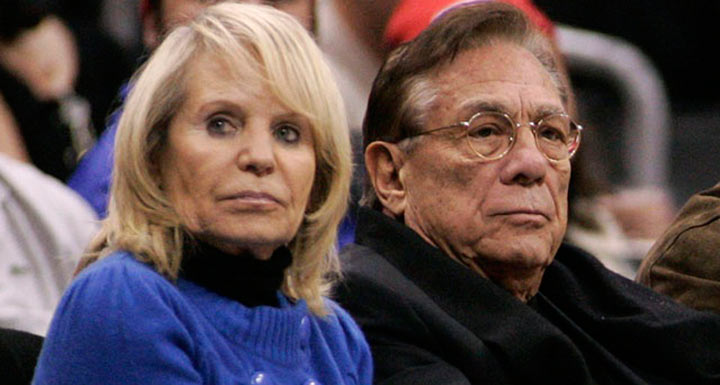
Sterling Loses in Court as Judge OKs Clippers Sale
A judge tentatively ruled against Donald Sterling and in favor of his estranged wife Shelly on Monday, in the trial over whether she had the authority to negotiate a $2 billion deal to sell the Los Angeles Clippers.
At issue was whether the embattled Clippers owner’s wife had acted within guidelines established by the Sterling Family Trust when she negotiated the potential record-setting deal with ex-Microsoft CEO Steve Ballmer.
“This is going to be a good thing for the city, for the league, for my family, for all of us,” Shelly Sterling said outside of court. “We do have love for each other, and I hope it’ll all work out between us, and it will.”
The tentative ruling in her favor will pave the way for the sale to move forward before NBA owners meet Aug. 15. It will remain tentative until all final objections are heard.
“We are pleased that the court has affirmed Shelly Sterling’s right to sell the Los Angeles Clippers to Steve Ballmer,” said Mike Bass, an NBA spokesman. “We look forward to the transaction closing as soon as possible.”
The judge said Monday the court believed Shelly Sterling was legitimately concerned about her husband’s well-being for several years, and that she reasonably expected he would sign the agreement with Ballmer.
The judge also said Shelly Sterling did not act with “unclean hands.”
NBC4’s Robert Kovacik spoke with Donald Sterling Monday. When asked about the decision, Donald Sterling said he had “no comment.”
The court invoked Section 1310(b) of the California Probate Code on the ruling, which makes it more difficult to appeal and will allow the sale to continue while lawyers continue to debate.
“The way he’s decided it, we have to get the court of appeals to allow us to take an appeal, which is not the normal thing,” Donald Sterling’s attorney Max Blecher said.
But Sterling’s attorneys vowed after the ruling that this was not the final act.
“He didn’t see this as the final battle ground, so this is, you know, one stage of a long war, this is one battle,” attorney Bobby Samini said. “We had hoped for a different result, but this is not the end.”
Lawyers for Sterling have argued that Shelly Sterling had no right to make the deal with Ballmer, even though Donald Sterling provided written authority to pursue a sale after the league moved to oust him as team owner because of racist comments he made during a recorded conversation with a companion.
The attorneys claimed Shelly Sterling tricked the NBA’s longest-tenured team owner into taking mental exams that found he had signs of the onset of Alzheimer’s disease.
Donald Sterling, 80, was removed as a trustee after two doctors found he lacked the mental capacity to handle his own business affairs. His attorney argued during the trial that the doctors were hand-picked by Shelly Sterling and did not perform adequate exams.
Later in the process, Donald Sterling tried to stop the sale by dissolving the trust. Shelly Sterling’s lawyers along with an attorney for Ballmer filed a legal brief citing case law that they said proves that Donald Sterling did not have the right to dissolve the trust that owned the Clippers.
They urged the judge to allow the sale and reject any delay if appeals are filed.
“The trust has a golden bird in the hand,” the brief said. “A sale of the Clippers for $2 billion is indisputably a bonanza for the Sterling family. Donald’s strident opposition is motivated by only selfish considerations. This court has the power to make this precedent-setting sale happen.”
The 49-page document notes that if the sale is ordered, it also could be delayed by numerous legal provisions in the probate code allowing review of the ruling. The lawyers urged Superior Court Judge Michael Levanas to streamline the procedure.
They cited Sterling’s vow on the witness stand to continue suing the NBA for the rest of his life and noted his threat to seek an injunction to stop the sale if the judge rules against him. Sterling spent much of his time on the stand berating his wife, the NBA and attorneys — including his own.
At one point, he called Shelly Sterling a “pig” as she left the witness stand.

